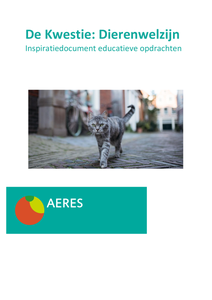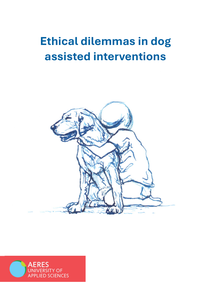From an interspecies perspective, we advocate for a theoretical foundation aimed at facilitating further research towards digitally mediated human-animal interaction. The proposed framework follows an approach we call 'digitally complemented zoomorphism' and recognizes 'play' as a free and voluntary activity that is shared by both animals and humans. As a result, three initial design guidelines will emerge. Our work is pursued in order to provide animals with stimulations which stem from a closer understanding of their perceptions and are not solely designed around human subjectivity.
DOCUMENT
From an interspecies perspective, we advocate for a theoretical foundation aimed at facilitating further research towards digitally mediated human-animal interaction. The proposed framework follows an approach we call 'digitally complemented zoomorphism' and recognizes 'play' as a free and voluntary activity that is shared by both animals and humans. As a result, three initial design guidelines will emerge. Our work is pursued in order to provide animals with stimulations which stem from a closer understanding of their perceptions and are not solely designed around human subjectivity.
LINK
Poster en begeleidende audio uit de guided tour van het Open Atelier van CoE Groen op 7 december 2023 over het project Welzijn van honden bij dierondersteunende interventies van het lectoraat Human Animal Interactions aan Aeres Hogeschool Dronten. Het doel van het project is om bij te dragen aan het professionaliseren van het werkveld door inzicht te geven in de impact die de interventies op de deelnemende honden kunnen hebben. Het project zit op het moment van het Open Atelier in de fase van de veldstudie. De gegevens worden verzameld door organisaties die honden inzetten voor dierondersteunende interventies. Uiteindelijk zal er materiaal voor de sector beschikbaar komen om meer mensen bewust te maken van het welzijn van honden en hoe ze daarmee bezig kunnen zijn tijdens de dierondersteunende interventies. Daarnaast zullen de uitkomsten uit dit project een houvast voor het werkveld geven om verdere richtlijnen te ontwikkelen met betrekking tot de inzet van honden in dierondersteunende interventies.
MULTIFILE
Poster en begeleidende audio uit de guided tour van het Open Atelier van CoE Groen op 7 december 2023 over het project Welzijn van honden bij dierondersteunende interventies van het lectoraat Human Animal Interactions aan Aeres Hogeschool Dronten. Het doel van het project is om bij te dragen aan het professionaliseren van het werkveld door inzicht te geven in de impact die de interventies op de deelnemende honden kunnen hebben. Het project zit op het moment van het Open Atelier in de fase van de veldstudie. De gegevens worden verzameld door organisaties die honden inzetten voor dierondersteunende interventies. Uiteindelijk zal er materiaal voor de sector beschikbaar komen om meer mensen bewust te maken van het welzijn van honden en hoe ze daarmee bezig kunnen zijn tijdens de dierondersteunende interventies. Daarnaast zullen de uitkomsten uit dit project een houvast voor het werkveld geven om verdere richtlijnen te ontwikkelen met betrekking tot de inzet van honden in dierondersteunende interventies.
MULTIFILE
Dierenwelzijn is een actueel en veelzijdig thema dat steeds meer aandacht krijgt in de maatschappij en het onderwijs. Dit inspiratiedocument hoort bij de gelijknamige documentaire en helpt docenten om het onderwerp op een educatieve, prikkelende en interactieve manier in de klas te behandelen. Met concrete opdrachten, discussievragen en verdiepingsopdrachten worden studenten uitgedaagd kritisch na te denken over ethische dilemma’s. Zo ontstaat inzicht in de impact van menselijk handelen en maatschappelijke keuzes rondom dierenwelzijn. Dit onderzoek is geproduceerd door het lectoraat Human-Animal Interactions
DOCUMENT

This article explores how concern about animal welfare and animal rights relates to ecological citizenship by discussing student assignments written about the Dutch Party for Animals or PvdD. ‘Animal welfare’, ‘animal rights’, and ‘ecological citizenship’ perspectives offer insights into strategic choices of eco-representatives and animal rights/welfare advocates as well as educators. The assignments balance animal issues with socio-economic ones, explore the relationship between sustainability and ethics, and attribute responsibility for unsustainable or unethical practices. Analysis of student assignments reveals nuanced positions on the anthropocentrism-ecocentrism continuum, showing students’ ability to critically rethink their place within larger environmental systems. Some students demonstrated compassion for nonhumans, indicating that biophilia is evenly distributed among different groups of students. This article finds that fostering pro-environmentalism and animal welfare or rights requires the deepening of the debate contesting but also connecting key issues in sustainability and ethics. This analysis can be valuable for political parties representing nonhumans, or for education practitioners in getting students to think about the challenges in human-environment relationships and for advancing support for ecodemocracy. https://ro.uow.edu.au/asj/vol8/iss1/10/ LinkedIn: https://www.linkedin.com/in/helenkopnina/
MULTIFILE

This article examines two areas of tension within environmental ethics literature and relates them to the case study of the animal representation in the Dutch media. On the one hand, there is a tension between those who propagate clear division between anthropocentric and non-anthropocentric views; on the other hand, there is a tension between the land ethics perspective and animal right proponents. This article examines the media representation of animals using content analysis, and links the findings back to the areas of tension within environmental ethics. The main findings indicate that the division between anthropocentric and ecocentric perspectives is still relevant for evaluating the human-animal relations, while the convergence of the land ethics and animal rights perspectives can be helpful in explaining why this division is relevant. This is a post-peer-review, pre-copyedit version of an article published in "Environmental Processes".The final authenticated version is available online at: https://doi.org/10.1007/s40710-014-0025-7 https://www.linkedin.com/in/helenkopnina/
MULTIFILE

Animal welfare is a multidimensional phenomenon and currently its on-farm assessment requires complex, multidimensional frameworks involving farm audits which are time-consuming, infrequent and expensive. The core principle of precision agriculture is to use sensor technologies to improve the efficiency of resource use by targeting resources to where they give a benefit. Precision livestock farming (PLF) enables farm animal management to move away from the group level to monitoring and managing individual animals. A range of precision livestock monitoring and control technologies have been developed, primarily to improve livestock production efficiency. Examples include using camera systems monitoring the movement of housed broiler chickens to detect problems with feeding systems or disease and leg-mounted accelerometers enabling the detection of the early stages of lameness in dairy cows. These systems are already improving farm animal welfare by, for example, improving the detection of health issues enabling more rapid treatment, or the detection of problems with feeding systems helping to reduce the risk of hunger. Environmental monitoring and control in buildings can improve animal comfort, and automatic milking systems facilitate animal choice and improve human-animal interactions. Although these precision livestock technologies monitor some parameters relevant to farm animal welfare (e.g. feeding, health), none of the systems yet provide the broad, multidimensional integration that is required to give a complete assessment of an animal’s welfare. However, data from PLF sensors could potentially be integrated into automated animal welfare assessment systems, although further research is needed to define and validate this approach.
DOCUMENT

If you are looking for examples of just how special dogs are, you will find thirteen wonderful examples in this book. These dogs have a knack for calming people down and picking up on tension—sometimes even better than we do! Each story highlights the incredible bond between dogs and humans, showcasing their unique talents. But there's more to it than just heartwarming tales.When dogs get involved in caregiving, it opens up a lot of questions and challenges. Some of these are more straightforward, like what health benefits come from having a dog around or how effective other methods are without using a dog. At the same time, the mix of caregiver, dog, and client brings up important questions about how to do the right thing, treat both people and animals well and evaluate various options available. That’s where ethics come into play—the core theme of this collection of stories. We’re not here to tell you what’s right or wrong; instead, we want to spark conversations about these topics. Ethics can be quite personal, but that doesn’t mean you have to tackle these decisions alone. By sharing experiences and discussing challenges, we can support each other and make better choices together.This collection of stories is part of a bigger two-year project that looks at how animal-assisted interventions affect the well-being of dogs. The research comes from the Human-Animal Interactions research group at Aeres University of Applied Sciences in Dronten, working alongside partners in the field, and was co-funded by the Regieorgaan SIA (Taskforce for Applied Research SIA), which is part of the Dutch Research Council (NWO). If you want to learn more about this research, check out the Human-Animal Interactions research group’s website.
DOCUMENT
